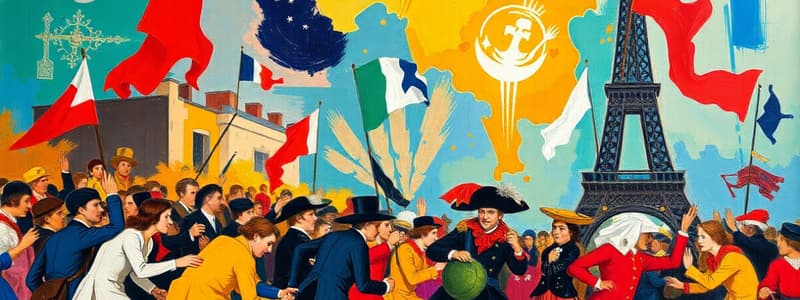Podcast
Questions and Answers
Which of the following best describes the primary outcome of the French Revolution?
Which of the following best describes the primary outcome of the French Revolution?
- The expansion of the French empire across Europe.
- The immediate establishment of a fully democratic government in France.
- The consolidation of power under a new absolute monarch.
- Significant changes to France's political structure, including the abolishment of the absolute monarchy and the feudal system. (correct)
The Estates-General was primarily composed of representatives from the First and Second Estates, effectively excluding the Third Estate from meaningful participation.
The Estates-General was primarily composed of representatives from the First and Second Estates, effectively excluding the Third Estate from meaningful participation.
False (B)
What was the main purpose of the Bastille prior to its storming in 1789?
What was the main purpose of the Bastille prior to its storming in 1789?
military fortress
The pre-revolution French society under the Ancien Régime was characterized by a heavy burden of ________, primarily on the Third Estate.
The pre-revolution French society under the Ancien Régime was characterized by a heavy burden of ________, primarily on the Third Estate.
Match the following terms to their descriptions:
Match the following terms to their descriptions:
Which of the following describes the tax obligations within the Ancien Régime before the French Revolution?
Which of the following describes the tax obligations within the Ancien Régime before the French Revolution?
Kings Louis XIV and XV were successful in their attempts to impose taxes on the First and Second Estates.
Kings Louis XIV and XV were successful in their attempts to impose taxes on the First and Second Estates.
What was the 'free gift' that the Church was obliged to pay?
What was the 'free gift' that the Church was obliged to pay?
Prior to the French Revolution, members of the peasantry were required to pay land tax to the _ _ _ _ and 5% property tax (vingtieme).
Prior to the French Revolution, members of the peasantry were required to pay land tax to the _ _ _ _ and 5% property tax (vingtieme).
Which of these factors significantly contributed to the financial strain experienced by the Third Estate under the Ancien Régime?
Which of these factors significantly contributed to the financial strain experienced by the Third Estate under the Ancien Régime?
Flashcards
French Revolution
French Revolution
A political and social upheaval in France that broke out in 1789 and ended in 1799, which ended the rule of French absolute monarchy.
Absolute Monarchy
Absolute Monarchy
A form of government in which one monarch has complete rule over a society.
Three Estates
Three Estates
The three divisions of French society before the revolution, characterized by unequal taxation.
Age of Enlightenment
Age of Enlightenment
Signup and view all the flashcards
National Assembly
National Assembly
Signup and view all the flashcards
Estates-General
Estates-General
Signup and view all the flashcards
Assembly of Notables
Assembly of Notables
Signup and view all the flashcards
Bastille
Bastille
Signup and view all the flashcards
Ancien Régime
Ancien Régime
Signup and view all the flashcards
Study Notes
- The French Revolution was a revolutionary event in modern European history that began in 1789 and ended in the late 1790s with Napoleon Bonaparte's rise to power.
- It reshaped France's political structure by abolishing the absolute monarchy and feudal system.
- While the revolution did not achieve all of its goals, it significantly influenced the development of modern nations by highlighting the power of the people's will.
Key Terms
- French Revolution: A political and social revolution in France that broke out in 1789 and ended in 1799, ending the rule of the French absolute monarchy.
- Absolute Monarchy: A form of government in which a society is completely ruled by one monarch.
- Three Estates: The estates of the realm under the Ancien Regime, which was characterized by the burden of taxation.
- Age of Enlightenment: Also known as the Age of Reason, it was a period in European history characterized by the ideas of liberty, equality, and science.
- National Assembly: An assembly formed on June 17, 1789, by delegates from the Third Estate after they split from the Estates-General.
- Estates-General: A form of representative assembly similar to a congress or parliament, with members representing all three estates.
- Assembly of Notables: A council composed of members from the First and Second Estates.
- Bastille: A military fortress built during the Hundred Years’ War in the 1300s to protect the eastern entrance of Paris from the English.
The Ancien Regime
- The estates of the realm under the Ancien Regime were characterized by the burden of taxation.
- The king was not part of any estate
- The peasantry, belonging to the Third Estate, produced food and paid heavy taxes under feudalism.
- Peasants and nobles were required to pay tithe, one-tenth of their income, to the Church.
- The Church was obligated to pay the crown tax known as a "free gift."
- Before the French Revolution, the peasantry paid land tax to the state and a 5% property tax (vingtieme).
- Royal obligations were paid through labor, in kind, and in coin (rare).
- Peasant farmers paid their landlords in cash.
- People from the Third Estate were forbidden from holding petty positions in the regime.
- Kings Louis XV and XIV attempted to impose taxes on the First and Second Estates but were unsuccessful.
Studying That Suits You
Use AI to generate personalized quizzes and flashcards to suit your learning preferences.



